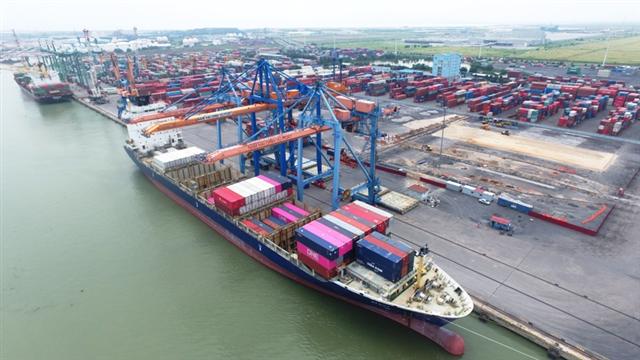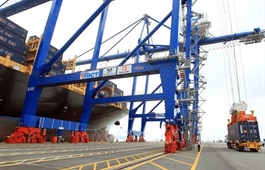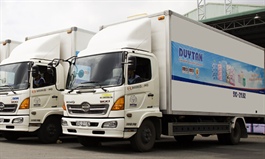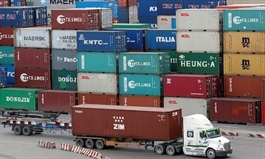Bright export outlook for Vietnam in 2021
Bright export outlook for Vietnam in 2021
In 2021, the trade ministry eyes an increase of 4-5% in trade turnover from an estimated US$543.9 billion last year.
A surge of nearly 20% year-on-year in export turnover in the first half of January to US$12.9 billion signal a bright outlook for Vietnam’s exports this year.

Cargo handling at Hai Phong port. Photo: Cong Hung.
|
Statistics from the General Department of Vietnam Customs (GDVC) revealed in the first 15 days of 2021, Vietnam recorded four groups of export staples with turnover of over US$1 billion, one group more than in the same period of last year. This newly-included group was machinery and equipment, which posted an export turnover of US$1.45 billion, up 72% year-on-year.
The three other groups were phones and parts with exports of US$2.86 billion, up US$1.5 billion year-on-year; computers, electronic products and parts with US$1.7 billion, up 10%; and textile with US$1.23 billion, down US$200 million.
Rice, one of Vietnam’s major agricultural export products, received positive news when the Ministry of Agricultural and Rural Development (MARD) held a ceremony on January 13 marking the export of Vietnam’s first batch of rice in 2021 by Trung An Hi-tech Farming Company, located in the southern city of Can Tho.
This special shipment with volume of 1,600 tons will be delivered to Malaysia and Singapore, those among Vietnam’s top 10 rice buyers.
On top of that, Trung An is preparing to deliver an order of nearly 2,000 tons of rice to Germany.
Meanwhile, local traders are preparing for the export of seafood and fruits to the EU, US, Japan, Canada, Australia and China to take advantage of the EU – Vietnam Free Trade Agreement (EVFTA) and the Regional Economic Comprehensive Partnership (RCEP).
Effective utilization of FTAs: key for Vietnam’s export success
The Ministry of Industry and Trade (MoIT) attributed a number of factors to the positive export outlook for Vietnam in 2021, including recent trade deals (CPTPP, EVFTA, RCEP, UKVFTA) that Vietnam is a member of, an ongoing shift in investment capital from regional countries to Vietnam, and the formation of new global supply chains.
Minister of Industry and Trade Tran Tuan Anh said to support the realization of Vietnam’s GDP growth target of 6.5% in 2021, the industry sector would aim at an expansion of the index of industrial production (IIP) at 8% year-on-year, and trade turnover to grow by 4-5%.
“The trade ministry continues to prioritize trade promotion activities and help local firms utilize preferential treatments from free trade agreements that Vietnam is a part of,” said Mr. Tuan Anh.
On the other hand, the Ministry of Industry and Trade (MoIT) would provide firms with updated information on issues that could impact export activities, such as changes in import policies, technical trade barriers, and risks in payment, he added.
Experts suggested as a member of next-generation trade deals, Vietnam holds favorable advantages to accelerate the economic recovery process, including exports.
Economist Nguyen Minh Phong urged local companies to focus on export products with high potential in foreign markets, including agricultural and industrial processing products.
“It is essential for Vietnamese enterprises to take on IT and e-commerce to expand their reach to export markets,” he noted.
Vice Minister of Industry and Trade Do Thang Hai said one of key priorities at the moment is to enhance local traders’ resilience against the Covid-19 pandemic, while providing supports for enterprises for effective utilization of preferential treatments from FTAs.
Chairman of the Vietnam Chamber of Commerce and Industry (VCCI) Vu Tien Loc said the MoIT should play an active role in ensuring the effective implementation of FTAs.
“Enterprises, however, must adopt a new mindset in engaging trading activities and boost capabilities in taking part in global supply chains,” stated Mr. Loc.
In 2020, Vietnam recorded trade turnover of US$543.9 billion, representing an increase of 5.1% year-on-year. This resulted in an all-time high trade surplus of US$19.1 billion, far exceeding the previous record figure of US$10.9 billion one year earlier.
























